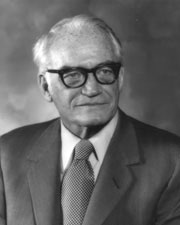Goldwater Rule
 From Conservapedia
From Conservapedia The Goldwater Rule is an ethical standard in psychiatry and psychology that forbids someone in those professions from expressing a mental health opinion about any individual, such as a candidate for president, in the absence of conducting a thorough private mental examination of the person and obtaining his fully informed consent before speaking to others about it.[1] The rule is named after Barry Goldwater, the 1964 Republican nominee.
The American Psychiatric Association (APA) reaffirmed its commitment to this ethical standard in March 2017, for the following reasons provided by the President of APA:[2]
- 1. When a psychiatrist comments about the behavior, symptoms, diagnosis, etc. of a public figure without consent, that psychiatrist has violated the principle that psychiatric evaluations be conducted with consent or authorization.
- 2. Offering a professional opinion on an individual that a psychiatrist has not examined is a departure from established methods of examination, which require careful study of medical history and first-hand examination of the patient. Such behavior compromises both the integrity of the psychiatrist and the profession.
- 3. When psychiatrists offer medical opinions about an individual they have not examined, they have the potential to stigmatize those with mental illness.
American Psychoanalytic Association said its members can ignore the Goldwater rule[edit]
Business Insider reports:
| “ | A leading psychiatry group has told its members they should not feel bound by a long-standing rule against commenting publicly on the mental state of public figures — even the president.
The statement, an email this month from the executive committee of the American Psychoanalytic Association to its 3,500 members, represents the first significant crack in the profession's decades-old united front aimed at preventing experts from discussing the psychiatric aspects of politicians' behavior.[3] |
” |
Karl Popper indicated that psychoanalysis is merely a pseudoscience because its claims are not testable and therefore they cannot falsifiable.[4] See also: Psychology and pseudoscience
Sigmund Freud and the atheistic and pseudoscientific Freudian psychoanalysis has had a cultish following.[5][6] See also: Atheist cults
Psychologists are the least religious of American professors.[7]
Freud was a proponent of the notion that theism was detrimental to mental health.[8] Oxford Professor Alister McGrath, author of the book The Twilight of Atheism, stated the following regarding Freud:
| “ | One of the most important criticisms that Sigmund Freud directed against religion was that it encourages unhealthy and dysfunctional outlooks on life. Having dismissed religion as an illusion, Freud went on to argue that it is a negative factor in personal development. At times, Freud's influence has been such that the elimination of a person's religious beliefs has been seen as a precondition for mental health.
Freud is now a fallen idol, the fall having been all the heavier for its postponement. There is now growing awareness of the importance of spirituality in health care, both as a positive factor in relation to well-being and as an issue to which patients have a right. The "Spirituality and Healing in Medicine" conference sponsored by Harvard Medical School in 1998 brought reports that 86 percent of Americans as a whole, 99 percent of family physicians, and 94 percent of HMO professionals believe that prayer, meditation, and other spiritual and religious practices exercise a major positive role within the healing process.[8] |
” |
References[edit]
- ↑ https://www.psychiatry.org/newsroom/goldwater-rule
- ↑ https://www.psychiatry.org/news-room/apa-blogs/apa-blog/2017/03/apa-remains-committed-to-supporting-goldwater-rule
- ↑ A major psychiatry group has said its members can defy a long-standing rule and discuss Trump's mental health, Business Insider
- ↑ Popper KR, "Science: Conjectures and Refutations", reprinted in Grim P (1990) Philosophy of Science and the Occult, Albany, 104–110
- ↑ The Freudian psychoanalysis cult by Kevin MacDonald, Ph.D.
- ↑ The pretensions of the Freudian cult by Thomas Szasz, The Spectator, 4 OCTOBER 1985, Page 32
- ↑ Psychologists are the least religious of American Professors
- ↑ 8.0 8.1 McGrath, Alister (February 28, 2005). "The twilight of atheism". Christianity Today website. Retrieved on May 23, 2015.
Categories: [United States Political Terms] [Psychiatry] [Psychology]
↧ Download as ZWI file | Last modified: 02/28/2023 07:16:01 | 8 views
☰ Source: https://www.conservapedia.com/Goldwater_Rule | License: CC BY-SA 3.0
 ZWI signed:
ZWI signed:

 KSF
KSF